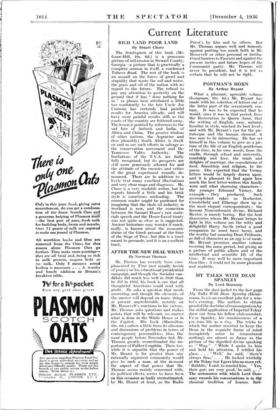AFTER THE NEW DEAL WHAT? By Norman Thomas Mr. Thomas
has recently been com- plimented by Time (not usually lavish of praise) on his educational presidential campaign, and though the Socialist can- didate did much less well in 1936- than he did in 1932, his book is one that all thoughtful Americans could read with profit. He asks a question that needs answering, and, though the elements of the answer will depend on many things at present unpredictable, notably on Mr. Roosevelt's reactions to his victory, Mr. Thomas asks questions and makes points that will be relevant, no matter what is done in the White House or in the Capitol. His book (Macmillan, 10s. 6d.) suffers a little from its allusions and discussions of problems in terms of contemporary personalities; thus, like most people before November 3rd, Mr. Thomas greatly overestimated the im- portance of Father Coughlin. Then, too, while it is arguable that the power of Mr. Hearst, is far greater than any rationally organised community would give to such a • man, at the moment the aspect of that 'power that Mr. Thomas seems mainly concerned with, its political effects, seems to have been on this occasion as badly overestimated, by Mr. Hearst at least, as the -Redid
Priest's by him and by others. But Mr. Thomas argues well and honestly against putting too much faith in Mr. Roosevelt or other personal or institu- tional barriers to Fascism and against the present tactics and future hopes of the Communist party. Mr. Thomas will never be president, but it is not sal certain that he will not be right.




















































 Previous page
Previous page